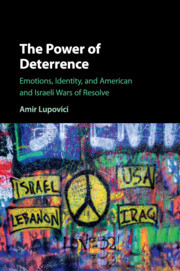Description
The Power of Deterrence
Emotions, Identity, and American and Israeli Wars of Resolve
Author: Lupovici Amir
Argues that states' attachment to the strategy of deterrence can increase the chances of violence rather than avoid it.
Language: English
Subject for The Power of Deterrence:
Approximative price 32.87 €
In Print (Delivery period: 14 days).
Add to cart
The Power of Deterrence
Publication date: 11-2018
242 p. · 15x23 cm · Paperback
Publication date: 11-2018
242 p. · 15x23 cm · Paperback
Approximative price 101.56 €
In Print (Delivery period: 14 days).
Add to cart
The Power of Deterrence
Publication date: 09-2016
Support: Print on demand
Publication date: 09-2016
Support: Print on demand
Description
/li>Contents
/li>Biography
/li>
Why do states persist in using force to enhance their deterrent posture, even though it is not clear that it is effective? This book develops an innovative framework to answer this question, viewing deterrence as an idea. This allows the author to explain how countries institutionalize deterrence strategy, and how this internalization affects policy. He argues that the US and Israel have both internalized deterrence ideas and become attached to these practices. For them, deterrence is not just a means to advance 'physical' security, but it constitutes their very selves as deterring actors. As a result, being unable to deter becomes a threat to their identity, evoking strong emotional responses. In recognizing these dynamics, the book provides a fresh perspective on the US war in Iraq (2003) and the Israeli war in Lebanon (2006), both of which can be seen as attempts to repair each country's shaken sense of self.
1. Introduction; 2. The constitution of the deterrer identity; 3. Ontological security, deterrence, and the use of force; 4. The US and the War on Terror; 5. Israel and the Lebanon War; 6. Conclusion.
Amir Lupovici is a Lecturer in the Department of Political Science at Tel-Aviv University. His research interests include constructivism, cyberspace, securitization, and deterrence. His previous publications have appeared in, among others, International Studies Quarterly, the Review of International Studies, the International Studies Review, and Foreign Policy Analysis.
© 2024 LAVOISIER S.A.S.




